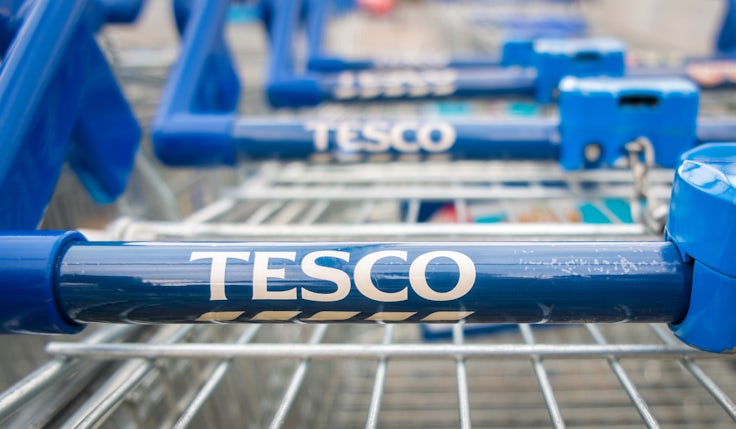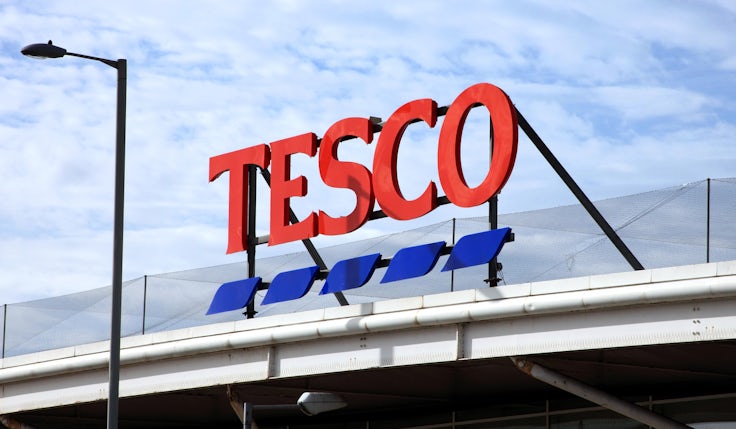Tesco banks on convenience and range to fend off discounters
Retail like-for-like sales increased 3.2% over the first half of Tesco’s fiscal year. However, with inflation driving up business costs, adjusted operating profit was down 10% to £1.25bn.
 Tesco is doubling down on providing consumers with a wide range of products and the most convenient proposition to prevent the loss of market share to discounters Aldi and Lidl, as the rising cost of living begins to drive “meaningful change” in consumer behaviour.
Tesco is doubling down on providing consumers with a wide range of products and the most convenient proposition to prevent the loss of market share to discounters Aldi and Lidl, as the rising cost of living begins to drive “meaningful change” in consumer behaviour.
Earlier this month Aldi officially became the UK’s fourth largest supermarket, knocking Morrisons out of the ‘Big Four’ for the first time. According to Kantar, the discounter grew sales by 18.7% over the 12 weeks to 4 September, boosting its market share to 9.3%. Tesco remains the UK’s largest supermarket, followed by Sainsbury’s and Asda.
The grocer has been committed to maintaining competitive pricing, with hundreds of products included in its Aldi Price Match range. Products within the range now make it into 99% of all large shopping baskets at Tesco and over 80% of top-up shops, the retailer reported in its half year results today (5 October).
However, it’s by providing convenience and range that Tesco believes it can keep customers from switching to the discounters, even as their wallets are increasingly squeezed, says CEO Ken Murphy.
“Tesco is the most convenient location for almost every British shopper in terms of proximity to the customer. We’re the only one which has a fully nationally comprehensive online proposition, a really extensive Tesco Express network and obviously the largest of the large store formats,” he explained on a call with press this morning.
“Our plan really is to be able to take away the worry that you’re paying more in our shop for all those essentials you can find in the limited range discounters, but also make sure you can get everything else you need. And that has served us really well.”
I don’t think we’re going to see any diminution of the quality and the coverage that we get for our marketing spend.
Ken Murphy, Tesco
Murphy identified Tesco’s convenience store format, Tesco Express, as having a “star performance” over the last six months. The supermarket opened an additional 17 Express stores over the period.
Online sales and orders both remain over 50% ahead of pre-Covid levels, with Tesco continuing to claim the leading online market share at 35.9%. The supermarket has continued to roll out click-and-collect sites, which are now within a 25 minute drive of more than 70% of UK households, and has also continued to roll out its rapid delivery service ‘Whoosh’, which is now in more than 400 sites. Tesco plans to get Whoosh into 800 sites by the year end.
Strong value and low prices still remain a focus, however. The supermarket today announced a new price-lock commitment on over one 1,000 everyday products until 2023. Products in the price lock include Tilda’s Pure Steamed Basmati Rice, 250g (£0.95), McCain’s Home Chips, 2.25kg (£4.30) and Heinz Baked Beans Snap Pots, 4 x 200g (£2.49).
“We’re doing a pretty good job, I think, in helping customers to keep a lid on the inflationary pressures of the shopping basket over the past six months and that’s something we’re committed to doing as we go forward,” Murphy said.
Consumer behaviour changes
Tesco has seen an “acceleration” in consumer behaviour changes over the summer, compared to the first quarter of the year, Murphy said.
The supermarket is seeing a “meaningful change” towards more frequent shops and smaller basket sizes, as well as less shopping online. This was “partially expected” as a reversal of pandemic-driven behaviour, but is also “partially people managing to a budget”.
Customers are also increasingly trading down to Tesco’s own-brand propositions and there has been some trade from fresh to frozen foods. Murphy also reported an overall reduction in general merchandise and clothing sales, relative to the boost seen during the pandemic.
Nevertheless, retail like-for-like sales increased 3.2% on a one-year basis, and 11.5% on a three-year basis. With inflation driving up business costs, total adjusted retail operating profit was down 10% at constant rates to £1.25bn.
Expectations for Christmas
Looking ahead to the festive season, Murphy told Marketing Week the business is “definitely” planning to invest “strongly” in its Christmas offer and, despite rising costs, would be maintaining its level of marketing.
“I don’t think we’re going to see any diminution of the quality and the coverage that we get for our marketing spend. Clearly we’re always looking to make that money work harder and be more efficient. But you will be seeing plenty of us on the airwaves over this Christmas,” he said.
Tesco CEO: Marketing is ‘more important than ever’ amid cost of living crisis
Commenting on trading expectations for the period, Murphy said research by Tesco shows its customers are “determined to have a great Christmas”, adding: “We’re determined to give it to them in the most affordable and effective way possible”.
The supermarket is anticipating more dining-in and celebrations at home, having already recorded 13% year-on-year growth in its premium own-brand Finest range over the last six months. It is therefore “dialling up” its proposition in wines and spirits to address demand for at-home entertaining.
To help customers manage their budgets and spread costs out over a longer period, Tesco has also brought its annual toy sale forward this year, launching it earlier this week.
Loyalty and retail media growth
Meanwhile, Tesco’s loyalty proposition Clubcard continued to report growth over the first half of the year, now used in approximately 75% of all Tesco sales. The number of customers accessing Clubcard via its app is now at 10 million in the UK.
Clubcard’s customer satisfaction score has increased by 505 basis points compared to the same period last year and its generosity perception score is up 359 basis points, the supermarket claimed.
Sales penetration increased by 9.8 percentage points year-on-year in the Republic of Ireland and 18.6 percentage points in Central Europe.
Tesco’s retail media proposition, the Tesco Media and Insights platform powered by Dunnhumby, is now working with over 450 consumer goods brands. The platform, launched late last year, opens up the wealth of customer data the retailer collects through its Clubcard users and in-store insights to brands and agencies, offering brands the opportunity to target Tesco customers through its platforms.
Murphy said the supermarket expects to continue seeing “really strong growth” in the platform moving forward.
“We think this is a fantastic tool for our supplier partners, both our own-brand suppliers and for branded suppliers, to really get to know their customers better and really improve the quality of the product and the proposition that they’re putting to our customers,” Murphy said.
“And more importantly, reduce the cost and increase the speed at which they can get that proposition on the market. So we’re very excited about that. It’s still a work in progress. But we’re working with many, many suppliers, and it’s got an exciting future, I think.”







Comments